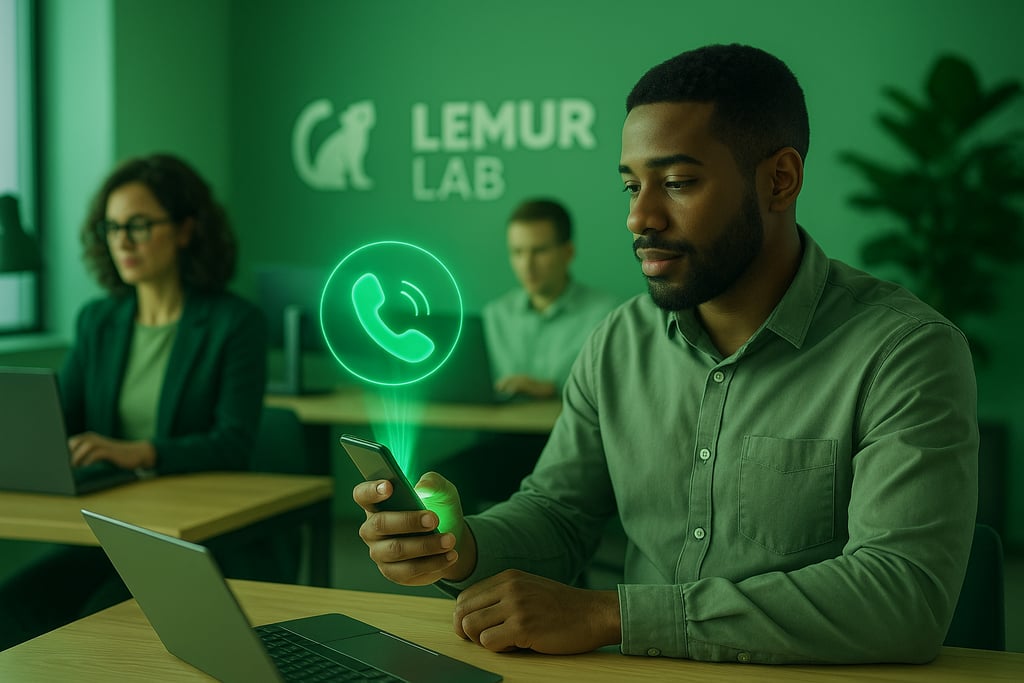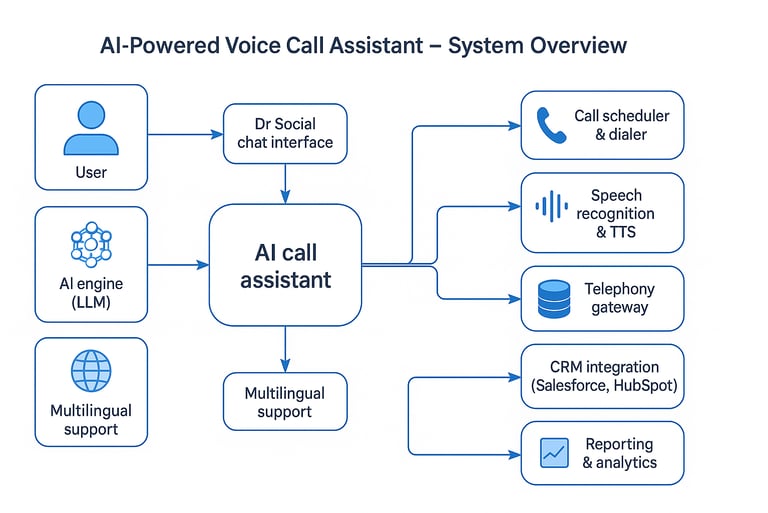AI-Powered Virtual Assistant for Phone Calls
The Lemur LAB team doesn’t stand still – we are constantly expanding our line of AI products to make life easier for businesses and users alike, helping them tackle routine tasks and save time. Today, we're excited to introduce a development that until yesterday seemed like science fiction, but now is already working and delivering results: our robotic phone call system powered by artificial intelligence.


Yes, now AI can make calls on your behalf, saving you valuable time and/or eliminating the stress of communicating with strangers. You no longer need to personally clarify hotel details, basic terms from vendors or suppliers, and a multitude of other pieces of information. The virtual assistant proactively reaches out, communicates politely, asks your desired questions, collects data, and even generates reports, tables, and summaries of the results – quickly, accurately, and without emotional strain.
Here are the advantages of our call assistant:
Integration with AI chat and deep research capabilities;
Automated dialing through a list of numbers;
International coverage;
Support for multiple languages (50+ currently);
24/7 availability;
High speed – capable of making over 50 quick calls per hour;
Synchronization with CRM systems, including Salesforce and HubSpot.
What is it and who will benefit?
Our voice assistant isn’t just a “robot that calls.” It's a full-fledged AI secretary that can take on dozens of routine tasks: make phone calls, verify information and data relevance online, negotiate discounts, or conduct quick surveys – all on behalf of the user.
It effectively functions as a personal assistant, office administrator, or even concierge. And it works tirelessly, without breaks, vacations, or days off – 24/7, any time of day or night. The call assistant not only saves time but also reduces costs: you don’t need to pay an operator's salary or use up a manager’s working hours. It doesn’t forget questions and won't annoy potential clients with random follow-up calls. Plus, it speaks multiple languages, always calmly, respectfully, and professionally.
All that remains for you is to provide the list of numbers (or ask the AI assistant to find them), prepare a script (a list of questions) and await the results.
Who will be interested in our AI-powered calls?
People who don’t have time for phone calls;
Users who dislike making phone calls, fear communication, or experience anxiety when interacting with strangers;
Individuals with inclusive needs, including those who are deaf or hard of hearing [or have other communication challenges];
Professionals looking to delegate a portion of their routine phone communication to AI;
Users with temporary limitations on speaking, such as jaw fractures, ligament inflammation, singers, and choir members, etc.
How it Works
The phone call feature is integrated into our AI system, Dr Social, meaning you can assign tasks to the virtual assistant directly within the chat – specifying the list of numbers to contact, etc. Users have two main scenarios for utilizing the robot:
* Standalone calling function: You formulate a request through the chat like "Call these numbers and find out if this product is in stock / is shipping possible today / does the establishment have a ramp at the entrance, etc.”
* Calls combined with AI functionality, including deep research. For example, you first present the system with a problem – “Find all hotels/vendors/service providers in the city, including filtering for those with good reviews (or a rating above 4)” – and then task it with calling these companies or individuals to clarify specific details.
Important! At this stage, our AI assistant doesn’t replace a sales manager or specialist in complex negotiations. It excels at typical tasks – making calls, clarifying information, sending reminders – but isn't yet ready for multi-step dialogues requiring flexibility, unconventional solutions, and consideration of the speaker’s mood and other nuances. These limitations are primarily due to the quality of mobile connection and the peculiarities of speech recognition in real conditions – with noise, interruptions, and accents. But we are actively working on this: improving algorithms, training the system, increasing accuracy and stability. In the future, AI calls will evolve from a “voice assistant” into a fully-fledged, highly qualified virtual specialist.
Use Cases & Success Stories
Finding an Inclusive Hotel
Let's say you’re travelling with a relative or friend who uses a wheelchair. You need to stay overnight in a hotel or apartment before continuing your journey. In this situation, it’s important that your temporary accommodation is truly convenient: a ramp at the entrance, a spacious elevator, grab bars in the bathroom. There may also be other preferences – more space, a TV with sports channels, a minibar, etc.
Of course, you could call various hotels yourself. You might find a suitable option after a couple of calls. But we suggest entrusting this task to the voice assistant – it will clarify everything for you. Here’s how it works:
Formulate a request to search for hotels and/or apartments in the AI chat. Specify the city and ask it to select options.
Narrow down the search by filtering for good places with high ratings (above 3.5, 4, 4.5, etc.).
Once the AI provides a list, you can instruct the call assistant to call, introduce itself, and ask if there’s a ramp. And if the initial response is positive, ask other questions – about the elevator, TV, etc.
After completing the calls, you can ask the system to generate a table with the results. For example, for all hotels or just those that are inclusive. Plus, you can filter by price or other criteria - proximity to the train station, bus terminal, etc.
Incidentally, similar scenarios could be useful for:
City officials who check whether various facilities meet inclusivity requirements;
Travellers planning their route and looking for places to stay with specific needs;
Managers organizing business trips for individual employees or entire teams;
People with a language barrier who are afraid or unwilling to communicate with foreigners about basic questions – booking hotels or tables in cafes, buying train tickets, sporting event tickets, etc.
2. Finding Products on Classifieds.
Another convenient scenario for using AI calls is finding the item you need on marketplaces or online classifieds sites. Let's say you’ve found several suitable listings, but you also need to quickly clarify details: what condition is the product in, is shipping available, can the price be reduced? Instead of spending time making calls yourself, you can assign the task to our virtual assistant. It will contact the sellers, clarify everything necessary, and provide a summary report.
Here’s how it works:
First, request a search for the product on classifieds sites.
Then, ask the AI to filter all offers by price.
Next, task the assistant with calling the sellers with suitable prices, aiming to:
* Clarify the possibility of a discount and its amount;
* Find out if same-day shipping is available, etc.
Based on the calls, the AI can generate a list of the best sellers for you. All that remains is to place your order.
A similar use case could be useful when:
Clarifying the current price and/or availability of goods from various vendors, including online stores, manufacturer websites, etc.;
Negotiating discounts;
Analyzing the competitive environment and identifying sellers’ willingness to offer discounts.
3. Assistant for Sales Managers
You can confidently connect the virtual secretary to initial calls to potential customers. For example, a sales manager delegates “cold” calls to the assistant, while focusing on warm leads and negotiations. The voice assistant provides basic information about the product or service, asks key questions, and determines whether there is genuine interest from the prospect. This approach helps quickly filter out the target audience and save the "salesperson’s" time.
Here's how it can be implemented:
Provide the AI assistant with a list of numbers that haven’t been called before or where previous contact attempts were unsuccessful.
Then, formulate simple yes/no questions. Such as: Are you interested in this product or service? Have you heard of brand X? Would you like to learn more details? So, if the assistant receives all “yes” answers, it thanks the person and promises to follow up later (for example, with a pretext – we’ll have discounts next week and will get back to you then).
Based on the mass calls, you can form a pool of potential customers who are worth talking to for the sales manager to clarify all the details. All “warm” leads can be entered into the CRM system with notes about when to call them again.
In this situation, a sales manager using the AI calling system will save time and increase their chances of closing a deal.
Similar use cases could be helpful when:
Calling potential suppliers regarding interest in cooperation or existing ones – regarding discounts, other details, etc.;
Solving internal business tasks, including determining stock levels, questions about product write-offs, checking the status of sick leave and vacations;
Cancelling appointments for various services at the last minute: you’re stuck in traffic or have gone to do something else, but need to contact your masseuse, doctor, hairdresser, fitness trainer, etc.
Our AI calling service is a convenient working solution for everyday and business tasks. It can take on routine calls: clarifying information, reminding, collecting data, conducting initial surveys, and even filtering potential customers. The assistant works tirelessly, doesn’t make mistakes, speaks politely and professionally. It's a real alternative to a secretary, saving your time and helping those who experience stress and/or anxiety when communicating with strangers.




Lemur LAB
© 2025. All rights reserved
Partner with our AI research lab
Join us at the frontier of machine intelligence. Share your idea or challenge in the form, and we’ll reach out to co-create pioneering research, rapid prototypes, and real-world solutions—together.
